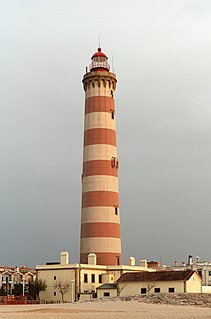
A lighthouse is a tower, building, or other type of structure designed to emit light from a system of lamps and lenses and to serve as a beacon for navigational aid, for maritime pilots at sea or on inland waterways.

Longships Lighthouse is an active 19th-century lighthouse about 1.25 mi (2.0 km) off the coast of Land's End in Cornwall, England. It is the second lighthouse to be built on Carn Bras, the highest of the Longships islets which rises 39 feet (12 m) above high water level. In 1988 the lighthouse was automated, and the keepers withdrawn. It is now remotely monitored from the Trinity House Operations & Planning Centre in Harwich, Essex.
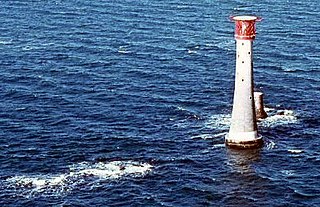
The Eddystone Lighthouse is a lighthouse that is located on the dangerous Eddystone Rocks, 9 statute miles (14 km) south of Rame Head in Cornwall, England. The rocks are submerged below the surface of the sea and are composed of Precambrian gneiss.
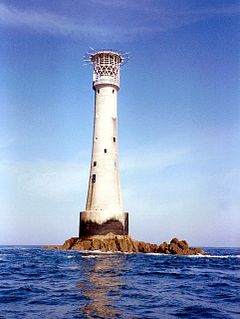
The Bishop Rock is a skerry off the British coast in the northern Atlantic Ocean known for its lighthouse. It is in the westernmost part of the Isles of Scilly, an archipelago 45 km (28 mi) off the southwestern tip of the Cornish peninsula of Great Britain. The Guinness Book of Records lists it as the world's smallest island with a building on it.
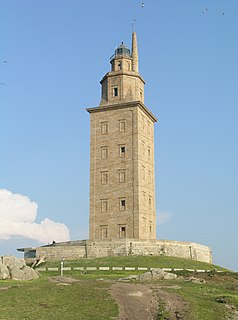
The history of lighthouses refers to the development of the use of towers, buildings, or other types of structure, as an aid to navigation for maritime pilots at sea or on inland waterways.

The American Shoal Light is located east of the Saddlebunch Keys, just offshore from Sugarloaf Key, close to Looe Key, in Florida, United States. It was completed in 1880, and first lit on July 15, 1880. The structure was built to the same plan and dimensions as the Fowey Rocks lighthouse, completed in 1878.
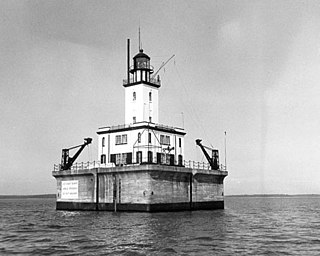
The DeTour Reef Light is a non-profit-operated lighthouse marking the southern entrance of the DeTour Passage between the eastern end of Michigan's Upper Peninsula and Drummond Island. The light is an automated active aid to navigation. It marks the northern end of Lake Huron. The passage is used by almost all of the Great Lakes commercial freighter traffic moving to and from Lake Superior, with approximately 5,000 vessel movements annually. It is said to be "the gateway to Lake Superior." In addition, many recreational boaters use the passage. The Light is located in Lake Huron, three miles (5 km) south of the nearest town, DeTour Village, Michigan.

Happisburgh Lighthouse in Happisburgh on the North Norfolk coast is the only independently operated lighthouse in Great Britain. It is also the oldest working lighthouse in East Anglia.
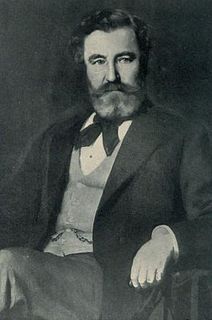
Sir James Nicholas Douglass, was an English civil engineer, a prolific lighthouse builder and designer, most famous for the design and construction of the fourth Eddystone Lighthouse, for which he was knighted.
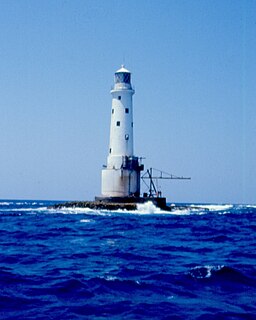
Great Basses Reef Lighthouse is an offshore lighthouse in the south of Sri Lanka, operated and maintained by the Sri Lanka Ports Authority. It is located on a reef 13 km off the coast of Yala National Park, near Little Basses Reef Lighthouse. It is accessible only by boat. The two Basses lighthouses, 'Great' and 'Little', are among the most famous offshore lighthouses of Asia.

Dondra Head Lighthouse is a lighthouse located on Dondra Head, Dondra, the southernmost point in Sri Lanka and is Sri Lanka's tallest lighthouse, and also one of the tallest in South East Asia. Dondra Head lighthouse is operated and maintained by the Sri Lanka Ports Authority.
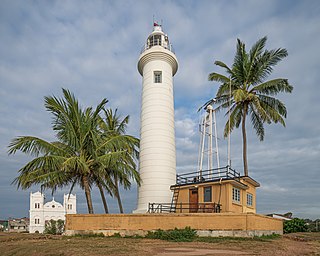
The Galle Lighthouse is an onshore Lighthouse in Galle, Sri Lanka and is operated and maintained by the Sri Lanka Ports Authority. This is Sri Lanka's oldest light station.

Hurst Point Lighthouse is located at Hurst Point in the English county of Hampshire, and guides vessels through the western approaches to the Solent.
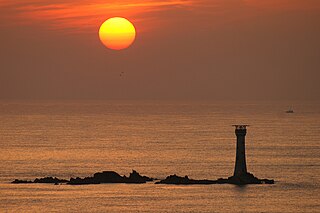
Les Hanois Lighthouse was constructed between 1860 and 1862 to a design by James Walker, and was first lit on 8 December 1862. It is sited on the rock known as Le Biseau, or Le Bisé, part of the reef Les Hanois one mile north west of Pleinmont where the Trinity House cottages were built. It was erected in response to an increasing number of shipwrecks on the treacherous rocks off the western coast of Guernsey.
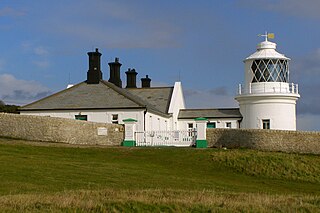
The Anvil Point Lighthouse is a fully-automated lighthouse located at Durlston Country Park near Swanage in Dorset, England. It is owned by Trinity House and currently operated as two holiday cottages.
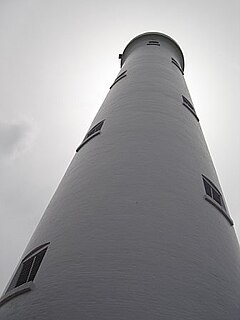
The Minicoy Island Lighthouse, which was established on 2 February 1885 at the southern end of the Minicoy Island in the Indian state of Lakshadweep during the British regime, is 49.5 metres (162 ft) in height and has now a range of 40 nautical miles (74 km) it is built in brick masonry and has a lantern and gallery.

William Douglass was for twenty-six years an engineer for Trinity House and engineer-in-chief to the Commissioners of Irish Lights from 1878 to 1900. He built a number of offshore lighthouses and was responsible for the design of the second Fastnet Rock lighthouse.

Blackhead Lighthouse is a listed lighthouse built at the turn of the 20th century, near Whitehead in County Antrim, Northern Ireland. It marks the very northern end of Belfast Lough where it opens out into the North Channel that separates Northern Ireland and Scotland. The active lighthouse is managed by the Commissioners of Irish Lights, where it is named as the Blackhead Antrim Lighthouse to distinguish it from the more modern Blackhead lighthouse in County Clare.
Hambantota Lighthouse is an onshore lighthouse, located on a rocky promontory in Hambantota, Sri Lanka.



















